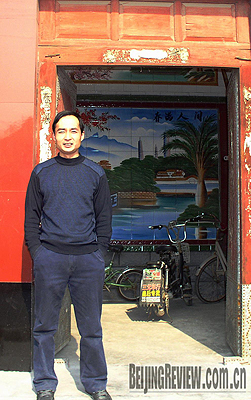|

WELL-OFF: Zhang Qingping, a farmer in Beihe Village, Zouping County, has a much better life now than he did 20 years ago (HU YUE)
The past decades have witnessed numerous rags-to-riches stories among farmers in Zouping, a county 70 km from Jinan, capital city of Shandong Province. Among them is Zhang Qingping who lives in Beihe Village on the county town's outskirts.
Shy, inarticulate and wearing a dusty blue sweater, the 34-year-old Zhang is the epitome of modern farmers of north China. Enjoying a much better life now than the older generation, Zhang considers himself one of the lucky ones who have been able to bask in the glow of the country's economic reforms.
It is not difficult to see how lucky Zhang has been. He lives in a spacious one-story brick house with his wife and two daughters, where the rooms are equipped with everything, including modern appliances and exquisite furniture that one expects to find in a comfortable home. Only a small plot of land planted with vegetables beside their backyard provides some clues about Zhang's profession as a farmer.
But Zhang is actually more than that. Beside farming, he works as a technician, providing support to several construction companies in the village.
"Doing an extra job off the land is commonplace in our village," Zhang told Beijing Review, in the thick accent of the eastern province of Shandong. "Mechanized farming could save us much time for doing something else."
The most significant change to his life happened in 1999, when village leaders decided to redesign the village's layout by removing all the old adobe houses, including Zhang's, and building brick ones, according to Yan Shengqing, a former Party secretary in the village.
The cost of each new house was 30,000 yuan ($4,392), an astronomical amount for a hand-to-mouth farmer like Zhang. "I pulled out my life savings for it," he said.
Born and raised in a dirt-poor family, Zhang can still remember the grinding poverty he grew up with in the old house.
"The houses we lived in were made of straw and mud," he said. "When it rained outside, it sprinkled inside the house. Our food was always sweet potatoes and steamed cornbread 20 years ago, and meat and rice were only possibly tasted on holidays. Our only appliance was a radio-no TV sets and refrigerators."
Getting married and building a new house almost at the same time brought the man considerable joy, as well as unprecedented financial pressure. Later after his two daughters were born, Zhang and his wife could hardly make ends meet by farming. As a result, he made a decision-to say goodbye to the backbreaking labor of the fields and seek better work in Jinan, the provincial capital.
"We had to make a living-there was no other way," he said. "Farming the fields just had no future."
But the big city that Zhang had imagined to be a golden heaven turned out not to be one after all. During his early days in Jinan, he earned only 300 yuan ($44) per month as a construction worker. The salary was much more than what he earned from farming, but the job was quite unstable. "After finishing a construction project, you'd have to look for the next one," he said.
When he was out of job, Zhang sought other ways to make a living, including working as a waiter or guard and delivering newspapers. In any case, he would regularly send his wife 200 yuan by post every month while keeping the rest for himself. Living on such a thin budget was tough, especially in a big city.
Unlike most of his peers, Zhang spent all his free time learning construction technologies from older technicians, reading related books and familiarizing himself with each link of a construction project.
Finally, his big opportunity came in 2002 when a Jinan real estate company hired him as a technician for a monthly salary of 800 yuan.
"This was like a meat pie falling from the sky!" he said. "I couldn't help laughing even in dreams those days."
With a boom in the province's real estate sector during the last few years, Zhang's career in Jinan had advanced with each passing day. But last year he decided to return to his village.
"It's not difficult now to land a job as technician in our village where there have been dozens of factories and construction companies," he said.
Zhang now earns around 1,800 yuan per month. In addition, he has resumed farming although the monthly income he receives as a technician has already been enough to ensure a comfortable life away from the land.
The man who saw no future in the land thinks differently now.
"The land is after all a safe harbor for us farmers to fall back on," Zhang said. "In addition, the planting yield has been increasing thanks to quality seeds and modern equipment."
Zhang added that his most important endeavor now is to start his own factory or workshop in the village.
"But my biggest wish for the future is to send my daughters to university," he said. "I dropped out of junior middle school, but I hope my daughters can be well educated and more capable than me." | 